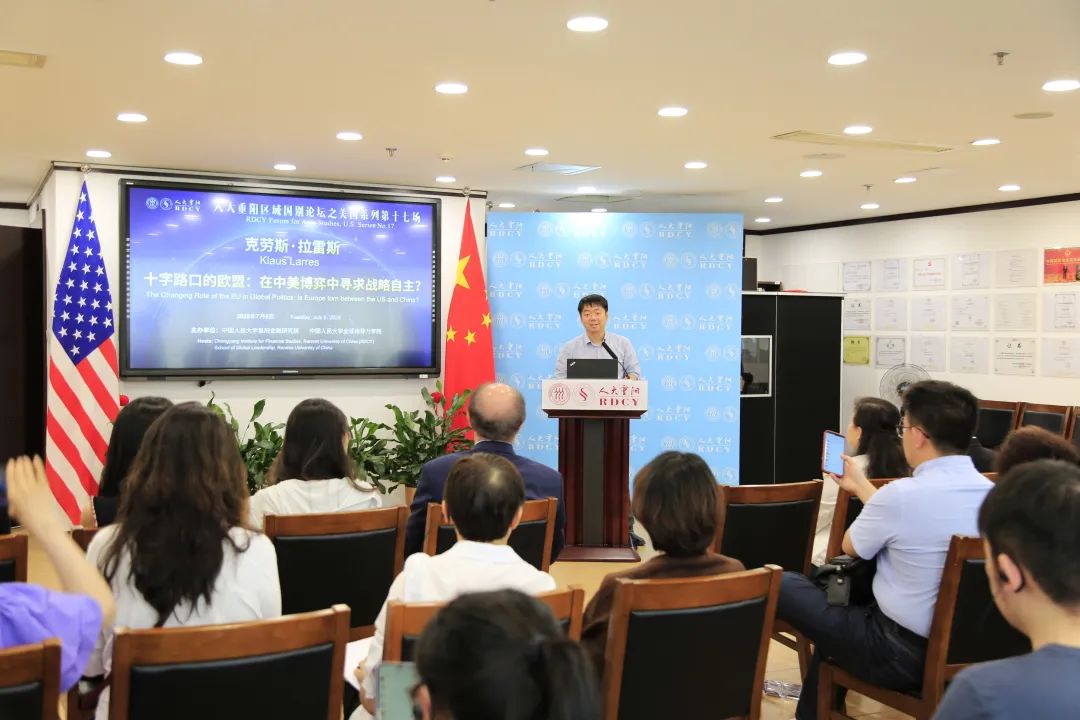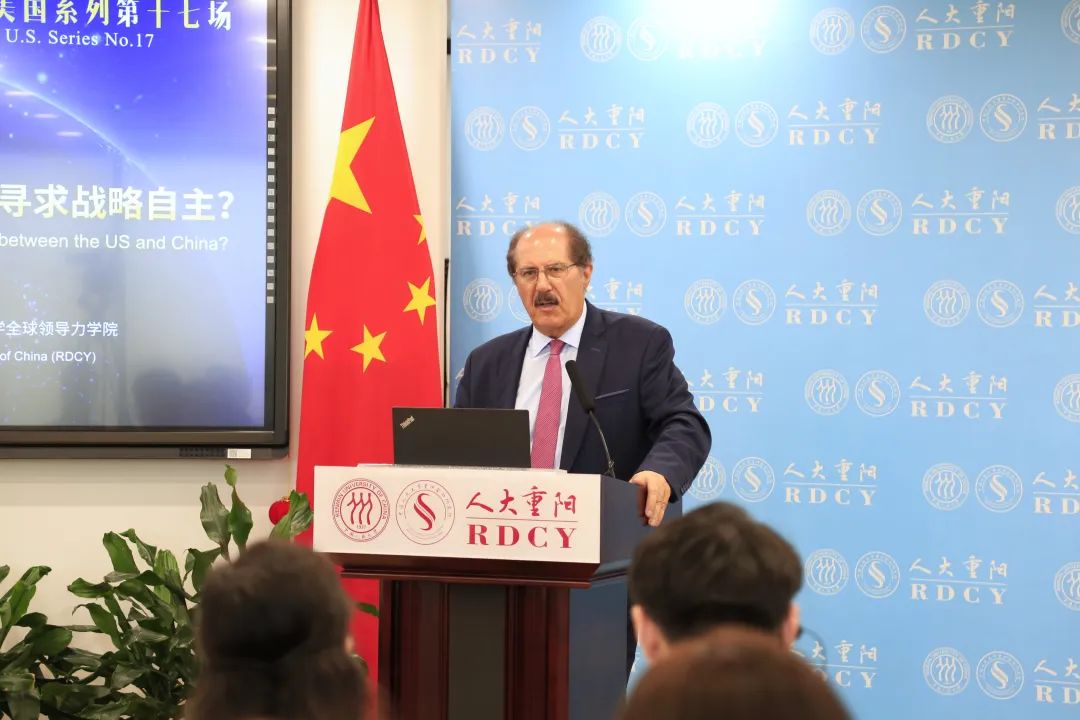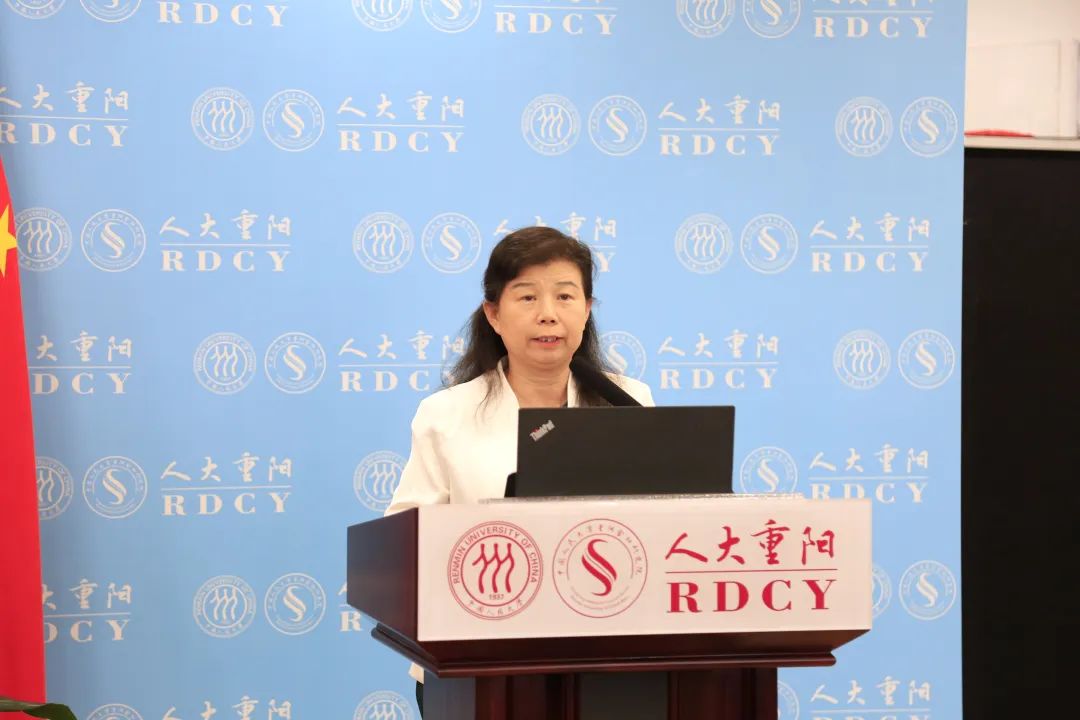Picture
Your Present Location: HOME> PictureKlaus Larres visit RDCY
Klaus Larres visit RDCY
Published Time: 2025-07-09
On July 8, renowned German scholar Klaus Larres, the Richard M. Krasno Distinguished Professor of History and International Affairs at the University of North Carolina at Chapel Hill and former Global Europe and Kissinger China Institute Fellow at the Woodrow Wilson Center, visited the Chongyang Institute for Financial Studies at Renmin University of China (RDCY). He delivered a keynote speech titled “The Changing Role of the EU in Global Politics: Is Europe Torn Between the US and China?” at the RDCY Forum for Area Studies, US Series No. 17. This was his second lecture at RDCY since September 2024. The event was covered by major media outlets including CCTV, Beijing Daily, Global People magazine, and the South China Morning Post.

In his welcome remarks, Wang Wen, Dean of RDCY and Dean of the School of Global Leadership at Renmin University of China, stated that many Chinese scholars are keen to understand the role of the EU in the context of US-China competition. He emphasized China’s desire to build positive relations with all countries and regions, highlighting the EU as a significant global force.
Opening his speech with a contrast between “good news” and “bad news,” Larres remarked, “The good news is that both Europe and China, as well as Europe and the US, still seek cooperation, but the bad news is that we are living in an unpredictable and highly uncertain era.” He stressed that although the transatlantic alliance remains strong, the Trump administration’s unilateralism and protectionism have made US-Europe relations more complicated than ever, placing their solidarity and mutual trust under severe strain. While the security alliance remains solid, economic and trade frictions are notably increasing.

Speaking on China-EU relations, Larres acknowledged persistent issues such as trade deficits, market access, and investment barriers. However, he underscored the strong willingness for cooperation on both sides. He explained that the concept of “decoupling” is gradually being replaced by “de-risking,” with the EU aiming to reduce economic dependency risks through supply chain diversification. He noted that the EU may deepen cooperation with countries such as India, Bangladesh, Vietnam, and those in South America to avoid overreliance on any single market, while also emphasizing the significant potential of China-EU economic ties.
Larres highlighted that this year marks the 50th anniversary of China-EU diplomatic relations, and the upcoming China-EU Summit presents a critical opportunity to strengthen bilateral ties further. Nonetheless, he cautioned that sensitive issues in trade and technology—such as electric vehicles, medical equipment, semiconductors, and rare earth resources—continue to pose challenges. He called for both sides to actively seek consensus and avoid escalating misunderstandings and frictions. He emphasized that achieving long-term win-win outcomes between China and the EU, much like sustaining a marriage, requires both sides to make mutual compromises.

During the discussion session, Liu Ying, Research Fellow at RDCY’s Area Studies Department, argued that as rifts grow between the US and Europe, China-EU cooperation is becoming closer in five respects. First, regarding the Russia-Ukraine conflict, the US treats Europe as a chessboard rather than a player, let alone as an ally or partner. Second, on trade and investment, the US and EU have failed to agree on tariffs, while China and the EU have shown a tendency and opportunities for cooperation. Third, on monetary policy, prices remain moderate in China and Europe, whereas the US still faces inflationary pressures. Fourth, in addressing climate change, Europe remains committed to the Paris Agreement, while the US has twice withdrawn, showing irresponsibility on climate issues. Fifth, while the US adheres to unilateralism and protectionism, both China and Europe firmly support multilateralism, especially the multilateral trading system with the WTO at its core.
During the Q&A session, audience questions covered topics including the impact of the Russia-Ukraine conflict on China-EU mutual trust and American students’ willingness to engage in exchanges with China. Larres called for expanded exchanges among young people and scholars to bridge cognitive gaps through “real campus and workplace experiences.”
The forum was moderated by Wu Qicong, Assistant Researcher at RDCY’s Industry Research Department.























































































 京公网安备 11010802037854号
京公网安备 11010802037854号





